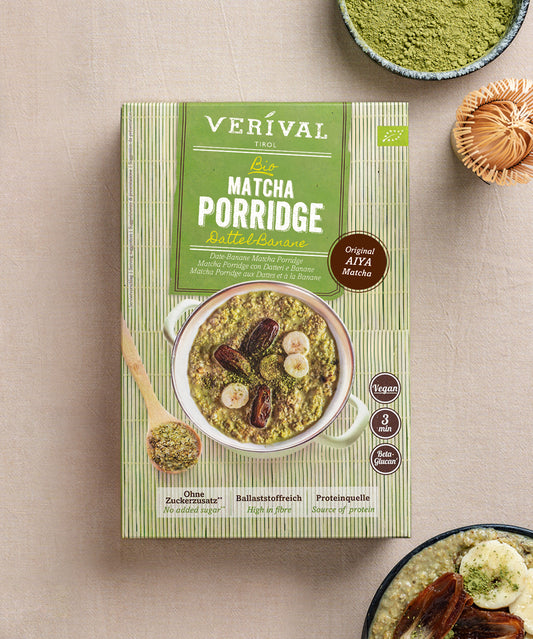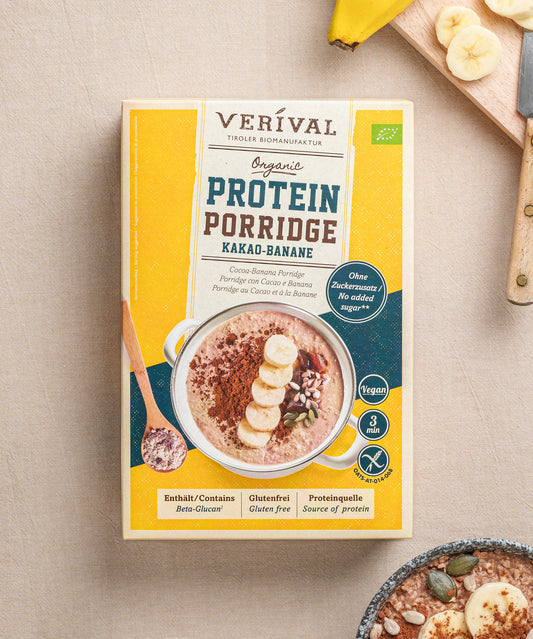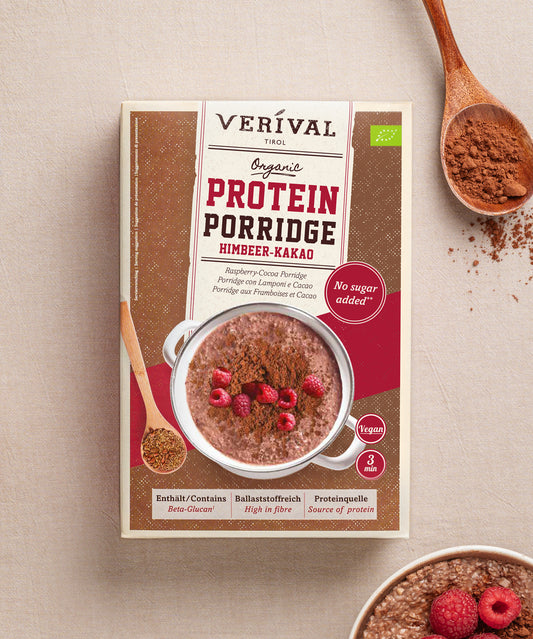‘Sugar-free,’ ‘no added sugar’ or ‘free from refined sugar’ – terms like these can be found on many food products today. But what exactly do they mean? Is ‘sugar-free’ automatically healthier, or is it just a marketing ploy? In this fact check, you will learn what lies behind the various labels, what myths surround sugar and how you can reduce your sugar consumption in everyday life without sacrificing enjoyment.
Verival muesli with no added sugar – try it now
What does ‘sugar-free’ mean?
According to the European Food Information Regulation, a product may be labelled ‘sugar-free’ if it contains no more than 0.5 grams of sugar per 100 grams or 100 millilitres. The term ‘sugar’ includes all simple sugars (monosaccharides) and double sugars (disaccharides), regardless of whether they occur naturally or are added.
Sugar-free or no added sugar?
In addition to ‘sugar-free’, some products also carry the label ‘no added sugar’. This means that no sugar has been added to the product. However, natural sugar from fruit or milk components may still be present. For example, muesli with no added sugar may contain fructose from dried fruit.
Both variants can be useful. The decisive factor is what else is in the product and how heavily it has been processed.
Free from refined sugar – what does this mean?
‘Free from refined sugar’ is not a protected term, but a voluntary label. It usually means that no white industrial sugar (sucrose) is used. Instead, manufacturers use alternative sweeteners such as coconut blossom sugar, date syrup or agave syrup.
These alternatives are considered more natural, but chemically speaking, they also contain sugar. Their main advantage is that they have a slightly lower glycaemic index and contain additional minerals. Nevertheless, you should only consume these alternative sweeteners in moderation.
Understanding food labelling
A glance at the list of ingredients often reveals more than advertising claims. Sugar has many names: glucose syrup, dextrose, fruit juice concentrate, maltose, honey or rice syrup. They are all types of sugar.
In the nutrition table, under ‘of which sugar’, you will find the total amount of all types of sugar contained, regardless of whether they occur naturally or have been added.
Also good to know: the higher up a sugar is in the list of ingredients, the greater its proportion in the product.
Fact check: the most common myths about sugar
Myth 1: ‘The body needs sugar to survive.’
It is true that our brain uses glucose as a source of energy. However, it does not need added sugar to do this. The body can produce glucose itself from other carbohydrates. A balanced diet with whole grains, fruit and vegetables provides us with sufficient energy.
Myth 2: ‘Sugar is instantly addictive, like drugs.’
Sugar activates the reward system in the brain, similar to positive emotions or exercise. This can make us feel better in the short term. However, it does not cause a real physical dependence like drugs do. Rather, it is a matter of habits and emotional associations that can be changed through conscious consumption of sweet foods.
Myth 3: ‘Fruit sugar is healthier than table sugar.’
Fructose sounds more natural, but it is problematic in large quantities. This is especially true when it comes in concentrated form from industrial sources, such as corn syrup or fruit juice concentrates. It is metabolised in the liver and can lead to fat accumulation if consumed in excess. Fructose from whole fruits, on the other hand, is harmless because it is accompanied by fibre, which slows down the breakdown of sugar.
Myth 4: ‘Sugar-free means healthy.’
Many sugar-free products contain additives, fats or sugar alcohols to compensate for the taste. However, this does not automatically make them healthier. Natural yoghurt with fresh fruit can often be a better choice than an industrially produced ‘sugar-free’ snack with numerous additives.
Myth 5: ‘Sweeteners are more harmful than sugar.’
At first glance, this statement sounds like a myth. However, current research shows that there may be some truth to it. A Brazilian study found evidence that low-calorie products with sweeteners can impair memory performance. Another study showed a possible link between regular sweetener consumption and an increased risk of diabetes.
The results are not yet conclusive, but they suggest that sweeteners are not automatically the better choice for a healthy diet. In this case, the supposed myth may not be a myth after all. A diet consisting of foods that are as natural and unprocessed as possible therefore remains the safest recommendation.
Health aspects of sugar consumption
Blood sugar and insulin
Sugar causes blood sugar levels to rise rapidly, prompting the body to release insulin. If the level then drops quickly again, this often leads to cravings. Long-term high sugar consumption can increase the risk of insulin resistance and type 2 diabetes.
Sugar and weight
Sugar provides energy but no nutrients. Excess calories are stored as fat. A diet high in sugar is associated with obesity and an increased risk of cardiovascular disease.
Intestinal flora, skin and teeth
Sugar promotes the growth of unfavourable intestinal bacteria and can contribute to inflammatory processes. Skin problems such as acne and dental diseases also occur more frequently when large amounts of sugar are consumed regularly.
Sugar and inflammation
High sugar consumption contributes to the development of so-called silent inflammation. This often goes unnoticed, but is linked to chronic diseases such as arteriosclerosis and metabolic disorders.
Tips for everyday life – less sugar, more enjoyment
1.Slowly retrain your sense of taste
Our taste buds adapt. If you reduce your sugar consumption, you will notice after just a few weeks that food tastes just as intense even with less sweetness.
2. Recognise hidden sugar
Many products contain sugar where you would not expect it – for example, in muesli, yoghurt, spreads or ready-made sauces. It's worth taking a look at the list of ingredients.
3. Use natural sweetness
Fresh or dried fruit adds natural sweetness to your breakfast without significantly affecting your blood sugar levels. Breakfast products from Verival with dried fruit and oats are also a good choice, as they use natural ingredients and contain no refined sugar.
4. Avoid sugar traps in everyday life
Soft drinks, energy drinks and sweetened coffees are the main sources of excess sugar. Water, tea or homemade smoothies are better alternatives.
Conclusion: Live sugar-free – but in moderation and with enjoyment
Sugar is not fundamentally ‘bad’. The decisive factor is the amount and form in which it is consumed. A conscious, balanced diet with natural ingredients helps to reduce sugar consumption without sacrificing enjoyment.
Those who choose products carefully, read ingredient lists and gradually retrain their taste buds can reap long-term benefits, such as stable energy levels, healthy skin and improved well-being.
Discover Verival organic breakfasts with no added sugar.
Frequently asked questions
Is sugar-free really healthy?
Sugar-free does not automatically mean healthy. Many sugar-free products contain additives, fats or sweeteners to balance the taste. The decisive factor is how balanced and natural the overall product composition is.
Is sugar-free really sugar-free?
Not always. A product can be considered ‘sugar-free’ if it contains less than 0.5 grams of sugar per 100 grams. Small amounts of natural sugar may still be present. It is therefore important to read the list of ingredients and the nutritional information table carefully.
























